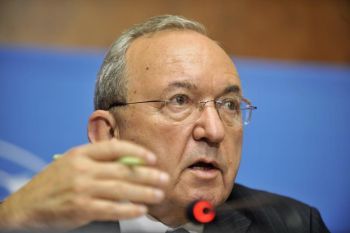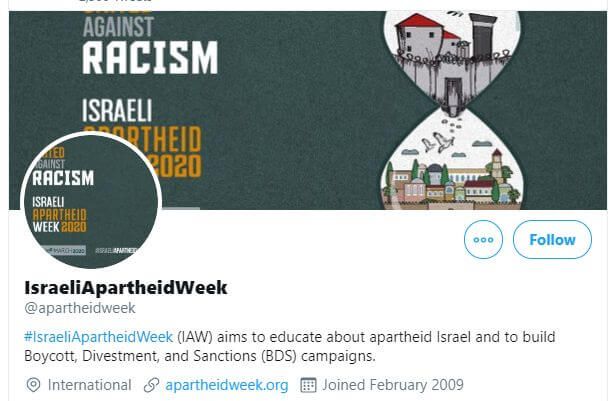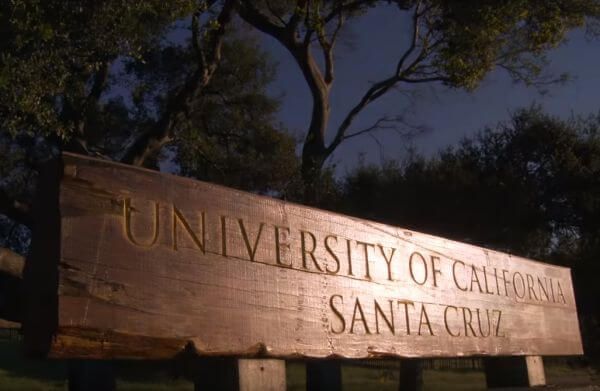Every spring, the annual “Israel Apartheid Week,” hate-fest hits students on university campuses in North America and Europe. In a bid to dupe impressionable young students into joining the ranks of the Boycott Divestment and Sanctions (BDS) campaign against Israel, Israel Apartheid Week is a one-sided propaganda event smearing Israel with the purposefully deceptive Israel-Apartheid label.
The blitzkrieg of Israel Apartheid Week activities and slogans accuse Israel of being an “apartheid regime,” exploiting Palestinians, and using “colonialism” and “ethnic cleansing.” However, despite being held on academic campuses, Israel Apartheid Week does not engage in discussion or debate, but instead employs what the Jewish Friends of Labour in the UK labeled “the most extreme end of anti-Israel activism.”
Join the fight for Israel’s fair coverage in the news
Israel Apartheid Week: The Strategy
Analysis of BDS strategies showed they are “consistent with antisemitic movements historically,” employing tactics that turn the Palestinian cause into a “class struggle.”
“Jews are given the choice of either joining the revolution for “justice” or being condemned,” noted Dr. Alex Joffe of the Begin-Sadat Center for Strategic Studies.
Organizers openly state that Israel Apartheid Week is an integral part of the boycott, divestment and sanctions campaign to delegitimize Israel. Their goal is to shut down any discussion that might support Israel, force academic institutions to cut all contacts with Israel including academic ties, divest themselves from any Israel-related investments and restrict academic freedoms by sanctioning professors or students who question BDS, or express support for the Jewish state.
As mercenaries wearing peace activist’s clothing, Israel Apartheid Week organizers use strong rhetoric and intimidation to create an atmosphere so that students and academics will conclude without question that Israel is like the old South Africa under apartheid rule. Using that analogy, the converts are recruited to support boycotts against Israel, similar to the boycott attempts against the former apartheid South Africa.
In his detailed analysis of BDS, Dan Diker of the Jerusalem Center for Public Affairs found that naïve supporters of the Palestinian cause were attracted to such campaigns “believing them to be mainstream organizations supporting the Palestinians. However, these campaigns are often run by the far-left, Islamist, or other anti-Israel radicals.”
The inflammatory animosity spread by Israel Apartheid Week activists goes beyond Israel and targets Jewish students.
Related reading: BDS Myths and Facts
“Frequently during Israeli Apartheid Week and BDS campaigns, Jewish students are singled out, harassed, intimidated and even assaulted, regardless of their feelings on Israel,” said Tammi Rossman-Benjamin, a lecturer at University of California – Santa Cruz. The intense anti-Israel sentiment at her university also triggered a religious backlash where a “staggering 70% of Jewish students experienced anti-Semitism.”
Despite the facts that show Israel is nothing like the former apartheid South Africa, the BDS tactic of repeating the “apartheid” mantra to spread it like a virus has resulted in the media and some diplomats misusing it both knowingly and apparently sometimes unwittingly.
Shooting Down the Myths
An internationally respected voice who shot down the myth of Israeli “apartheid” belongs to Richard Goldstone, the prominent South African judge who later headed a UN inquiry into the 2009-10 war ignited by the Hamas terror group. His final report was seen as rewarding Palestinian terror, condemned by Israel and used as ammunition by BDS and the organizers of Israel Apartheid Week. (Goldstone later expressed regret for the report.)
However, what the Israel Apartheid Week organizers ignore is that Goldstone helped dismantle apartheid in South Africa and was offended by Palestinians hijacking the term.

“In Israel, there is no apartheid. Nothing there comes close to the definition of apartheid,” Goldstone wrote in the New York Times.
Goldstone pointed out that unlike South Africa, Israeli law does not enshrine the concept of separation and domination of one people over another. “In Israel, equal rights are the law, the aspiration and the ideal; inequities are often successfully challenged in court.”
He eloquently pointed out how the Palestinian issue was specifically not apartheid:
The situation in the West Bank is more complex. But here too there is no intent to maintain “an institutionalized regime of systematic oppression and domination by one racial group.” This is a critical distinction, even if Israel acts oppressively toward Palestinians there. South Africa’s enforced racial separation was intended to permanently benefit the white minority, to the detriment of other races. By contrast, Israel has agreed in concept to the existence of a Palestinian state in Gaza and almost all of the West Bank, and is calling for the Palestinians to negotiate the parameters.
South African journalist Rolene Marks astutely observed that “even in the darkest days of Apartheid, NOBODY questioned South Africa’s right to exist as a country, no matter how much the world objected to its racist policies.”
Related reading: The False Israel-Apartheid Libel
Climate of Fear on Campuses
Contrarily, the BDS goal is not to create a democratic Palestinian state, but instead disassemble Israel. Activists do not call for a two-state solution and BDS has no goal of resolving the conflict.

First held on a Canadian campus in 2005, Israel Apartheid Week was angrily condemned by Canadian Prime Minister Justin Trudeau who said: “The BDS movement, like Israeli Apartheid Week, has no place on Canadian campuses.”
…Canadian Jewish students on campuses no longer feel safe or free to express themselves and express their political views on campus. Any time a Canadian student is feeling unsafe on their campus because of a movement, that does cause an issue with me and that is why I have been clear and I will continue to be clear in condemning Israel apartheid week and the BDS movement.
Canadian Prime Minister Justin Trudeau, April 16, 2019
The BDS movement, like Israeli Apartheid Week, has no place on Canadian campuses. As a @McGillU alum, I’m disappointed. #EnoughIsEnough
— Justin Trudeau (@JustinTrudeau) March 13, 2015
At the peak of vitriol, one Israel Apartheid Week organizer called Canada an apartheid state like Israel. That drew a strong rebuke in the Canadian media that ridiculed the “hypocrites in the “Israeli Apartheid” movement” and that Israel Apartheid Week amounted to a “trendy pretense put on by bigots and marginalized radicals.”
Related reading: Do Arab Israelis Really Suffer From Apartheid?
There is also opposition to BDS and Israel Apartheid Week in the Palestinian sector where peace advocates say it hurts their efforts. Prominent human rights activist Bassem Eid said: “As a Palestinian dedicated to working for peace … I do not believe that the BDS advocates are helping our cause. On the contrary, they are just creating more hatred, enmity, and polarization.”
Judge Goldstone, widely respected in South Africa for his role in helping dismantle apartheid and transition South Africa into a full democracy, speaks with authority when he shoots down the main claim of the BDS movement and the rationale behind Israel Apartheid Week:
“The charge that Israel is an apartheid state is a false and malicious one that precludes, rather than promotes, peace and harmony,” Goldstone concludes.
Liked this article? Follow HonestReporting on Twitter, Facebook, Instagram and TikTok to see even more posts and videos debunking news bias and smears, as well as other content explaining what’s really going on in Israel and the region.
Featured image: via Freepik; UC Santa Cruz via YouTube/US Santa Cruz; Goldstone CC BY-NC-ND UN Geneva; Trudeau CC BY Steve Jurvetson;




